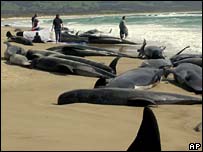Untitled Document
 |
The pilot whales became stranded
last week |
The Australian navy has denied its ships were behind the mysterious
deaths of whales in Tasmania.
At least 130 pilot whales died after beaching themselves on Tasmania's
rugged Marian Bay.
Environmentalists want to know if the navy's sonar equipment can actually
disrupt the navigation systems of whales and dolphins.
Scientists have taken samples from the dead mammals as they try to work out
why such mass strandings occur.
Disorientated
No-one knows why so many ended up on the beach.
Australian defence officials have said there is nothing to suggest that the
presence of naval vessels using high-frequency sonar was to blame.
Other experts have speculated that the stricken animals had become disorientated
in unpredictable coastal waters.
Rosemary Gales, who is a marine biologist, says it is not the first time that
whales have died in such large numbers in the area.
"This is a bad one," she said. "It's certainly not the most
extreme, but Marian Bay unfortunately has a sad history of having mass strandings
of pilot whales.
"But on a good note, these animals are small enough to rescue and so at
least we have been able to put some back to sea."
Wildlife officials have been forced to dig large graves in the sand to bury
the carcasses of more than 130 pilot whales.
There was a similar problem last year when dozens of long-finned pilot whales
and bottlenose dolphins died after also beaching in Tasmania.

